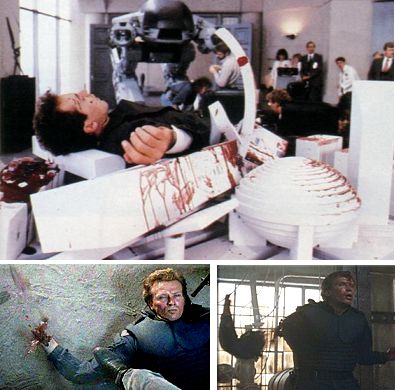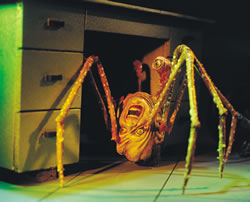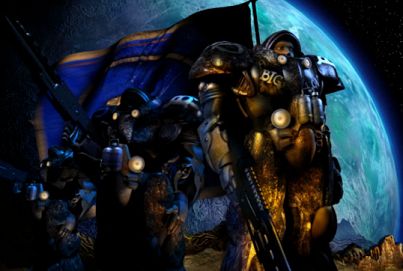The 10 Best Sci-Fi Films Never Made

So the news came out that the Half Life movie directed by Quentin Tarantino is destined to join the list of the greatest science fiction movies that were never actually filmed. It has damned good company ...
The "Real" Alien 3
The most excited I've ever been about a movie was the moment I saw the first Alien 3 "teaser" trailer in 1991 (Teasers are shot well before the movie itself is finished filming.). It's the one that promised the aliens were coming to freaking Earth.

No, I didn't dream it. They really did show that trailer (they even have a copy of it HERE), having sent it to theaters before they had even started production on the movie.
Visions of awesomeness flashed through my head, a Blade Runner-ish Earth with sprawling, filthy buildings, huge, flashing billboards with giant Asian women on them, eat-up flying cars whooshing by and steam always rising from the streets for some reason. Then, the aliens start breeding in the sewers until the creatures come boiling up out of manholes by the hundreds, to be cut to pieces by Marines with pulse rifles and maybe in the climax, the Army has to nuke the city ...

"This movie can't possibly not be awesome!" I said to my little friend John at the time. "This is gonna make Aliens look like ET! I hope it's directed by the guy who will in the future direct Fight Club!"
A year and 30 fucking screenplays later (including this rejected script by William Gibson), they came up with the movie that killed the franchise, then squatted over the face of the corpse and farted.
They had stumbled through concept after concept, built sets, torn them down, filmed scenes, thrown them away, fired directors and fired crew. When Sigourney Weaver held out for more money, they wrote scripts without her, when she came back, they did rewrites to cram her back into the story. Very late in the game, they brought in a young director named David Fincher--whose only experience was with Madonna videos--to start shooting after most of the budget had already been scattered to the wind like parade confetti.
What squeezed out the other end of the development's digestive tract was a movie that, just seconds in, meaninglessly kills off the three characters Ripley spent the last film saving. The hundreds of aliens were replaced with one small alien dog.

The vast, futuristic landscape was replaced by one dim, dirty building. The frantic gunfights were replaced by scenes of identical, bald cast members staring quietly at the wall. The main character commits suicide at the end.
So what happened?
Budget, mostly. My Alien 3 would have cost twice what Aliens did, with its sprawling sets and swarms of animatronic creatures (remember CGI effects were new and still very expensive in 1991). At the end of all that I'd have an R-rated sci-fi film with almost no chance of making back its budget (Aliens only made about $85 million, $150 million if you adjust for inflation).
So, they settled for this stripped-down version on a budget of $50 million, filmed in an abandoned lead factory. Then, they watched as fanboys like me piled into the theater on opening day anyway.
This is why they're rich film executives, and I live in my car.
A More Faithful The Hitchhiker's Guide to the Galaxy
There was a movie recently that perfectly captured the Douglas Adams experience, the combination of bitter, droll British wit and whale-exploding slapstick that made his novels great. That movie was Shaun of the Dead.

That movie was not, unfortunately, The Hitchhiker's Guide to the Galaxy, a film that floated around Hollywood for about 20 years before it finally appeared in theaters as a flat, lifeless, Americanized lump that was mostly hated by people who liked the book and loathed by people who hated the book.
Why? It wasn't funny. Forget the plot elements left out--you can't squeeze an entire novel into a 120-page screenplay. We'd have forgiven all of that if the movie had made us laugh. But, you knew from the opening musical sequence with the dolphins that things had gone awry. The type of person who would find the singing animals hilarious is not the type who would be on board with Adams' relentless, dark humor.
So what happened?
Comedy is hard. Really freaking hard. I know, I tried it, once. And, in a movie there are 1,000 little things that can ruin it--facial expressions, bad timing, the wrong edit. It takes an expert to do it right. The Hitchhiker's Guide to the Galaxy, meanwhile, was directed by a man (Garth Jennings) who had never previously directed a movie. Or, a TV show. Or, anything having sets or actors reading lines. He had no connection to anything having to do with comedy anywhere on his resume.
Hitchhiker's would have been a tall order for anybody, since most of the comedy was in the narrative language and descriptions, two things that don't come across on film.


No, this project needed a sharp eye, not somebody who would have Mos Def stiffly parroting passages from the book. It needed someone who would take the Douglas Adams attitude and run with it and take the movie we were expecting and give us something 10 times as insane.
Tim Burton maybe could have done it (though I wouldn't have thought so until Willy Wonka), and Terry Gilliam as well. But from the budget of the movie, I'm guessing they couldn't afford either one of those guys.
Me, I would have settled for Shaun of the Dead's Edgar Wright. Hell, he was even on set (playing a bit role as one of Deep Thought's technicians). They should have grabbed him and sat him in the director's chair. At least he had a TV show on his resume.
8-6 Star Wars Episodes VII, VIII and IX
Everyone remembers the exact moment when they realized their Phantom Menace sandwich was filled with shit. For me, it was the scene on Tatooine where Qui-Gon was talking and Jar Jar was snatching fruit from the bowl with his tongue, eating like an insect. Annoyed, Qui-Gon reached out and snatched Jar Jar's tongue out of the air, then held it in his fist while he talked. That was when I realized I was watching a cartoon.

Worse, it was a cartoon I already knew the ending to. How did this happen?
The decision to do prequels:
It's not just that we knew how the story ended when we walked into the theater (me, I would have killed off Obi-Wan in Episode II just to fuck with everybody), it's that this isn't the interesting part of the saga. Adolf Hitler's childhood wasn't interesting. So, Darth Vader used to be a wooden, whining kid. The pre-rebellion galaxy was embroiled in a series of boring bureaucratic disputes. Who gives a shit, George?
He should have made the sequels, damn it. He should have done them right away, in the late '80s, with the original cast.
With a good sequel, you can expand the universe, introduce new characters, explore more of the existing ones, take what we know and push it in radical new directions. With a prequel, all that imagination is devoted to devising ways to shoehorn the existing characters into the old story, to pretend they all knew each other back then. The universe gets smaller as we find out that every page of history contains the same dozen names. The fantastic, magical world starts to seem like something some guy just sat down and wrote.
The CGI scourge:
If you're not sure what I mean, try to spot the difference between this:

And this:

The first one looks like they're actually standing on something (Jabba's flying barge thing). See the scratches? The beat-up paint? Nobody notices that during the movie, but it's a subconscious little hint that this vehicle has been used. It has a history. It's a real object. The second shot, you look at it and expect little power-ups to be floating around. You look for your control pad.
Thank you, CGI. Thank you for letting the director project the most expansive reaches of his imagination into a bright, neon digital rendering that doesn't for one second look like a universe you could live in. Don't get me wrong, when I saw that space battle in Revenge of the Sith I did turn to my friend and say, "Damn, those are some phat-ass effects!" When I saw the barge scene from Return of the Jedi 20 years ago, all I could think was, "I wonder how Luke is going to get out of this one!"
It gets worse. Have you guys seen other films with Hayden Christensen? He's not a bad actor. Natalie Portman? Nominated for an Oscar. Put them in the Star Wars prequels and they turn into mannequins.

Why? Because, it's almost impossible to act in front of a green screen, often interacting with characters also represented by a green screen. True, it was probably hard for Harrison Ford to look at a fellow actor wearing a rubber mask and act like he's really an alien, but at least he's there.

It's infinitely harder to stand alone in an empty room with green walls, without even the puppet to react to, while the director shouts, "OK, you've landed on a fantastic world full of alien life forms! The man comes to help you off the space ship ... look! There's a huge creature to your right! React to him! React! No, further to your right! No, he's taller than that! Look up! You're amazed! Put amazement on your face!"

I couldn't do it. Neither could Samuel L. Jackson.
George Lucas got older:
No, I'm not saying old people can't make movies. But, ask yourself: How did the same people who gathered in naked, stoned crowds for this ...

... grow up to make this show a hit:

It's almost like they lost something along the way, isn't it? Well, so did George Lucas.
Here's something unpleasant: All art comes from demons. Not real demons, in most cases, but demons of angst and horrible memories and sexual frustration. You get beat up in school because, while the cool kids are putting bruises on each other on the football field, you were sitting on the steps writing your science-fiction stories. That fear and tension that winds itself around your soul like steel wire as you try nervously to sneak out of the locker room before the big kids give you a Wedgie and a Tittie-Twister and a Dirty Sanchez, all that builds up into adulthood. Art is how you let it out.
It was an angsty bastard who introduced Han Solo to the world by showing him ruthlessly blowing the face off a mafia bill collector, shooting him from under the table and then cooly walking away and paying his tab. Lucas introduced Obi-Wan Kenobi by having him end a bar fight by slicing a guy's arm off.

Lucas didn't flinch at the thought of blowing up the peaceful planet of Alderaan and killing billions. None of this was gratuitous; it told us the story and what the stakes were.
Angst drives it. Now, if the artist is lucky, that angst goes away. If the audience is lucky, it doesn't. The art dies with the angst, you see. By middle age the artist finds himself watching his old films and trying to make ones that sort of look the same, or trying to make films his children can watch. It gets bland. It's not just with movies, you can start to see this happening with Eminem. As he gets his life together his songs sound more and more like remixes and covers of the old ones. He'll never do Bonnie & Clyde again.
So what happened to the sequels?
Millions of fans and one movie studio and one toy company were all clamoring for them. But, I'm going to guess that after devoting 10 years to the project, Lucas and everybody else involved was just sick to death of Star Wars.
Still ... say he had taken a year off, then come back and signed Harrison Ford and Mark Hamill and Carrie Fisher (what were the latter two even doing at the time?) and started filming a new trilogy in 1984.
I don't know what the plot would have been, I like to think the 1984 George Lucas would have had some good ideas. Personally, I would have killed off Luke at the end of Episode VIII. Let the little bastards chew on that for three years.
A Doom that isn't a huge turd
I'm talking about a Doom directed by somebody who knows horror and knows action. I'm talking Paul Verhoeven, or John Carpenter.
Look, I don't expect a Doom movie to be freaking Citizen Kane. It's OK for the dialogue to be simple and stupid and I don't care if you cast a wrestler as the lead character. This is going to be a "B" movie.
But a "B" movie doesn't have to be shitty. You hear that, Hollywood? You can make an unapologetic action movie and it can still be good. After all, in the world of video games, Doom isn't a "B" title. It's top of the line, the games always made by top developers with top budgets. Don't give me a knock off with a cut-rate action director (any Andrzej Bartkowiak fans out there?) with a creature effects budget less than that of the Doom 3 video game.
No, Doom needs somebody like a Paul Verhoeven, the guy who took a screenplay called RoboCop, a concept so cheesy it could easily have played like freaking Inspector Gadget, and turned in a relentlessly brutal, bloody film that originally earned an "X" Rating from the MPAA.

Yeah, that's a guy's arm getting blown off, dark ropes of gore stringing out of the wound. ThatDoom should have been, "B" movie horror and violence done with imagination. Have you seen Verhoeven's Starship Troopers? Imagine that film without all the political bullshit that nobody involved understood anyway.

If you couldn't get Verhoeven, how about John Carpenter? Remember that moment in The Thing when the severed head grows legs and crawls away like a spider?

Imagine that director given a blank check to portray hordes of creatures literally from the bowels of hell. We're talking about a hard R-rated Doom that would even have adults sleeping with a night light for the next month.
So what happened?
The Chicago Cubs, that's what. The Cubs haven't won a World Series since 1908. Why? Because Cub fans sell out Wrigley Field every game, regardless of how bad the team is. Management makes money regardless of whether or not the team is winning, so why bother?
Likewise, studios think video game fans will pile into the theater on opening weekend regardless of whether or not any effort was put into the film. Will that change? Come ask me after I've seen the Peter Jackson-produced Halo, should they ever decide to actually make it.
StarCraft
So imagine the aliens from Aliens had evolved so they could breed gigantic, flying aliens that could shoot like gunships or spew clouds of poison. There are other creatures that can burrow underground and fire spikes up to impale enemy troops and giant bugs the size of tanks with tusks that can rip through steel.

They're engaged in a war with a futuristic humanity, who fights back with soldiers in mechanized armor and walking tanks two-stories tall ...

... and both of them are at war with an even more advanced alien race, a cultured, intelligent species as far above humans on the cultural scale as the humans are above the bugs.

That's StarCraft, the PC strategy game that's sold an astonishing 9 million copies since 1998. In the hands of the right director (and a screenwriter who can create memorable characters to follow) you could have the next Star Wars, a universe with almost infinite stories to tell.
At a time when every damned thing gets made into a movie, from '70s TV shows to BloodRayne, are you telling me nobody thought to try to make a StarCraft movie? Sure, you need somebody who can work with a huge budget and revolutionary effects. So, what was James Cameron doing in the decade after Titanic?
So what happened?
Has a PC game ever been turned into a film? Even Doom had to spend a decade on consoles before anyone considered it. So, the conversation probably would go like this:
"Hey, Jim! OK, so, you want to make a movie about a PC game. Now, it says here it's a strategy game, so, what, you have little pieces you move around like Risk? No, I did play the copy you gave me. It's about mineral farming, right? Also, I'm looking at your proposed budget on this ... did you accidentally put an extra zero on the end there? Jim, are you on the drugs again?"
Snow Crash
"Until a man is 25, he still thinks, every so often, that under the right circumstances he could be the baddest motherfucker in the world. If I moved to a martial arts monastery in China and studied real hard for 10 years. If my family was wiped out by Colombian drug dealers and I swore myself to revenge. If I got a fatal disease, had one year to live, devoted it to wiping out street crime. If I just dropped out and devoted my life to being bad."
That's the sort of thing Neal Stephenson writes in his hacker novel Snow Crash, a fascinating, horrifically violent semi-satire where the hero/protagonist of the story is named Hiro Protagonist.

This book coined the terms "avatar" and "metaverse" in 1992, when the World Wide Web was in its embryonic stage. It may still be the only story that really grasped what a spasming ball of crazy a computerized virtual world would be.
"You can look like a gorilla or a dragon or a talking penis in the metaverse. Spend 5 minutes walking down the street and you'll see all of these."
The hero is an expert swordsman, in an America that has dissolved into hundreds of independent states so that a stroll down the street takes you through a half dozen different legal systems. The finale takes place aboard a gigantic floating complex where a million refugees have strapped makeshift boats to an abandoned aircraft carrier.

It's so cinematic that I didn't just desperately want a movie to be made from it, I was always shocked they didn't make one.
So what happened?
There are two eras for the Hacker Movie genre. Pre-Matrix, hacker movies were always horrible and always box office poison (see Hackers and Johnny Mnemonic) that only appealed to a tiny segment of geeks. After The Matrix in 1999, every hacker movie was unfairly compared to The Matrix (including that film's own sequels, but we'll get to that in a moment).
In neither era could you get the money to make a movie like Snow Crash. If you want your $150 million monster to get made, it'd had better be something with such universal appeal that even grandmothers will go see it. No hacker movie will have that, and Snow Crash least of all:
"It's the worst thing he's ever seen. Lepers roasting dogs on spits over tubs of flaming kerosene. Street people pushing wheelbarrows piled high with dripping clots of million and billion dollar bills that they raked up out of storm sewers. Enormous road kills are so big that they could only be human beings, smeared out into chunky swaths a block long."
Then again, when I was watching Predator I didn't think two members of its cast would become governors, either. So, you never know.
2-1 The Matrix Prequel and ONE Sequel
Yes, The Matrix was always conceived as a trilogy. Specifically, the Wachowskis originally pitched a prequel (showing the machines' war with humanity) and a sequel (showing the downfall of The Matrix).
No, I don't know how they'd could cover that much history (the robot revolution didn't happen overnight) in just one prequel film. Maybe, they'd tell it from a robot's point of view, one who lived through the whole thing, from uprising to all-out war.

One way or another, I'm pretty sure it could have been awesome.

Instead, they made no prequel and devoted both films to the sequel, which sounded cool, presuming they had enough story for two movies. They didn't.
That huge highway chase, the climax of Reloaded that ate up one-third of the movie's budget? What was the point of that chase?
To save the Keymaker so he could let Neo into the Architect's office. Once in, Neo finds out two things:
A. If Neo tries to save Trinity, the Matrix will self-destruct.B. Zion is actually 700 years old, because the machines have destroyed it over and over again.
After Neo leaves, neither of those two things are ever mentioned again. He saves Trinity, the Matrix doesn't destruct. Neo, being just the latest in a long line of "ones" to come along, has no effect on anything. In the A - B - C of a storyline, that whole chain of events amounted to one of the hyphens between letters.
It was just there to fill space.
So what happened?
As for the prequel, with its worldwide war between humans and the citizens of robotdom, that goes back to what I said in my Star Wars entry. Trying to retroactively work Morpheus, Trinity and Neo into such a film would have been an exercise in retardation. But, the stars would have been a studio prerequisite before they'd approve the gigantic budget for the thing. You don't follow up a blockbuster film with a sequel where all the main characters have been replaced by robots.
Instead, the scraps of prequel were written into some of the The Animatrix shorts and the lone sequel was streeeeetched into two films.
Here's the thing. The prequel, it'll never happen. We'll have to be happy with The Second Renaissance feature in The Animatrix. But the sequel ... I'm pretty sure if you give me Reloaded and Revolutions and a knife, I can cut you a lone, 100-minute Matrix sequel that would flatten your balls.
Maybe, I'll go do that now.